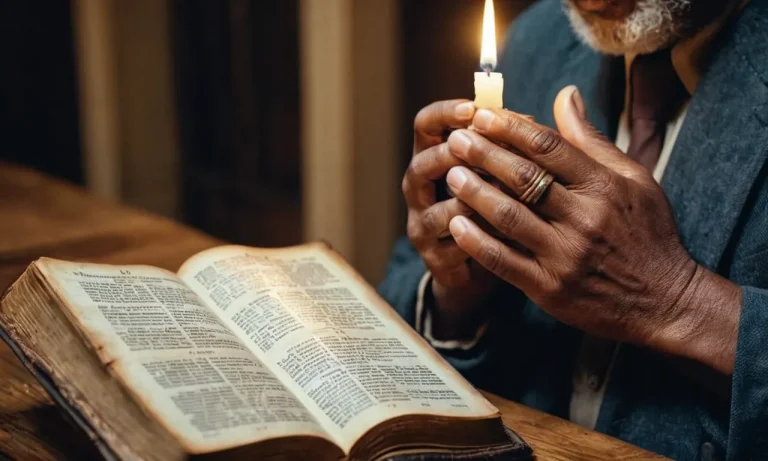Does Jesus Know When He Will Return?
The return of Jesus Christ is one of the most hotly debated topics in Christian theology. For centuries, believers have wondered if Jesus himself knows the exact time of his second coming, or if only God the Father knows the hour.
If you’re short on time, here’s a quick answer to your question: According to most mainstream Christian denominations, Jesus gave up some of his divine attributes when he became human. Therefore, in his human form, Jesus does not know the exact time of his return.
In this comprehensive article, we will examine relevant Bible verses, look at the teachings of major Christian denominations, explore what early Church fathers had to say about this question, and more. By the end, you will have a thorough understanding of the evidence on both sides of this issue.
Bible Verses about Jesus’s Foreknowledge
Jesus’s Own Words in the Gospels
In the Gospels, Jesus made several statements indicating that he did not know the exact time of his return. For example, in Mark 13:32, Jesus said plainly: “But about that day or hour no one knows, not even the angels in heaven, nor the Son, but only the Father.”
This verse clearly shows that Jesus did not have foreknowledge of the precise timing, which only the Father knows.
However, Jesus did provide signs to look for that would indicate his return was drawing near. In Matthew 24, when asked about the sign of his coming and the end of the age, Jesus shared various signs like wars, famines, earthquakes, persecution of believers, false prophets, and the gospel being preached throughout the world.
He then said, “So also, when you see all these things, you know that he is near, at the very gates” (Matt 24:33).
So while Jesus did not know the exact day or hour, he could discern the general season of his return based on global conditions and fulfillment of prophecy. But the precise timing is known only to God the Father.
Statements from Apostle Paul
The Apostle Paul also indicated that Jesus’s return would come suddenly and unexpectedly, like “a thief in the night” (1 Thess. 5:2). He explained that unbelievers will be caught off guard, but believers who remain alert and self-controlled will not be surprised “like others” (1 Thess 5:4-6).
Paul clarified that no one knows the timing, including himself: “But concerning that day and hour no one knows, not even the angels of heaven, nor the Son, but the Father only” (Matt. 24:36). Here Paul reiterates Jesus’s statement about the unexpected timing known only to the Father.
So based on Jesus’s words and Paul’s teachings, we see that only God the Father knows the precise day and hour when Christ will return. But believers are called to discern the general season based on prophecy and world conditions.
And most of all, we must remain spiritually alert and ready for Jesus’s sudden appearance.
Perspectives from Different Christian Traditions
Roman Catholicism
The Roman Catholic Church holds the view that no one knows the exact time when Christ will return, as Jesus himself said in Matthew 24:36 that “concerning that day and hour no one knows, not even the angels of heaven, nor the Son, but the Father only.”
However, the Church believes that certain signs will precede Christ’s Second Coming, such as wars, famines, natural disasters, false prophets, and the persecution of Christians.
The Catechism of the Catholic Church states that before Christ returns in glory “the Church must pass through a final trial that will shake the faith of many believers” (CCC 675). This time of tribulation and suffering will be accompanied by the appearance of the “Antichrist” who will lead many into apostasy before Christ defeats him.
While the time of Christ’s return is unknown, Catholics believe they must be spiritually prepared through prayer, penance, and living according to Christ’s teachings.
Eastern Orthodoxy
In Eastern Orthodoxy, it is believed that only God the Father knows the time of Christ’s Second Coming. Jesus said in Matthew 24:36 that “concerning that day and hour no one knows” – this includes Jesus himself while incarnate on earth.
The Eastern Orthodox Church teaches that Christians should live in constant expectation of the Second Coming, while avoiding speculation about its precise timing.
Some signs of the Second Coming according to Eastern Orthodoxy are wars, rising heresies, a growing indifference to religion, natural disasters, and the preaching of the Gospel to all nations. But the unexpected nature of Christ’s return requires constant watchfulness and spiritual preparedness through prayer, repentance, and partaking regularly in the sacraments of the Church.
While the time is unknown, Eastern Orthodoxy calls Christians to live godly lives so they are ready whenever the Lord returns.
Protestantism
Within Protestantism perspectives vary about knowing the timing of Jesus’ return. Mainstream Protestants emphasize Jesus’ teaching that no one knows the day or hour, only the Father (Matthew 24:36). This discourages date setting or end times predictions.
At the same time, some Protestants such as early Lutherans or Puritans believed signs like wars, natural disasters, and false prophets suggest the end is near.
Some Protestant groups like Seventh-day Adventists have set specific dates for Christ’s return based on their interpretation of biblical prophecy. Other Protestants are amillennialist, believing biblical references to the millennium in Revelation 20 are symbolic and do not refer to a literal 1,000 year period.
This view discourages focus on end times chronology. Overall Protestants affirm the unexpected nature of Christ’s return and importance of spiritual readiness rather than prediction.
Views of the Early Church Fathers
The early church fathers, writing in the first few centuries after Christ’s death and resurrection, expressed a variety of views on the timing of Jesus’ return. Here is a summary of some of their perspectives:
Imminent Return View
Many early church fathers expressed the belief that Jesus could return at any moment. The eminent early church historian Eusebius wrote: “The Apostles and their disciples took up the words of Christ with such solemnity and simplicity that they despised even death itself, and were found ready to die for the faith which they had embraced.”
Examples of early church fathers who held to an imminent return of Christ include:
- Clement of Rome (1st century)
- The Shepherd of Hermas (2nd century)
- Igantius of Antioch (c. 35-107)
- The Didache (late 1st or early 2nd century)
These early writers often encouraged believers to live holy lives in light of the soon return of Jesus. The Didache for example, states: “Watch for your life’s sake. Let not your lamps be quenched, nor your loins unloosed; but be ready, for you know not the hour in which our Lord comes.”
Delayed Return View
However, not all early church fathers thought Jesus’ return was imminent. Some suggested that certain events must transpire first before Christ would come back. The Epistle of Barnabas (late 1st century) taught that the prophesied end times temple must be rebuilt before Jesus returns.
Tertullian (c. 160 – c. 225 AD), one of the most famous early church fathers from Carthage, wrote:
“But He has in His own times manifested it, at His own will, in the observance of His own law. From the creation of the world He has made promises for its restitution; and has conferred the honor of prophecy on the fathers and holy ones.
The apostles, again, in the last days of the dispensation, have, by prophetic powers, developed for us the whole mystery of the Scripture.”
Here Tertullian suggests a delay between Christ’s first and second comings, with certain prophecies and developments needing to occur first.
No Speculation View
Finally, some church fathers expressed caution about setting dates or speculating on the precise timing of Jesus’ return. Irenaeus of Lyons (died c. 202 AD) famously stated:
“For He shall never come as a poor lowly man from heaven, who, while He lived here on earth, had no place where to lay His head. Neither shall His coming be as a time of insults and persecution; nor shall He be clothed with mean raiment as before: but He shall appear as the ineffable light and brightness of the Father, as the greatness of Almighty God.”
Here Irenaeus avoids speculation and simply encourages faith in Christ’s assured return in glory.
Augustine of Hippo (354 – 430 AD) also avoided date-setting, arguing forcefully against the popular attempts in his day to predict the timing of Christ’s return.
So while the early church fathers had diverse views and sometimes disagreements, they were united in eagerly awaiting the promised return of Jesus Christ, even if unsure of the precise timing.
Evidence Supporting Jesus’s Limited Foreknowledge
There are several passages in the Gospels that seem to indicate that Jesus did not know certain details about the timing of future events, suggesting he had limited foreknowledge while on earth. Here is an overview of some of the key evidence:
Statements About Not Knowing the Timing
In Matthew 24:36, Jesus plainly states: “But about that day or hour no one knows, not even the angels in heaven, nor the Son, but only the Father. “ This verse indicates Jesus did not know the exact timing of his return while in his earthly ministry.
Similar statements are made in Mark 13:32 and Acts 1:7 where Jesus says “It is not for you to know” regarding the appointed time for the restoration of the kingdom to Israel. These verses suggest Jesus voluntarily restricted his foreknowledge of certain events, including the timing of his second coming.
Questions Jesus Asked
There are several instances recorded in the Gospels where Jesus asks questions as if seeking information. For example:
- In Mark 5:30, Jesus asks “Who touched my clothes?” after a woman touches his garment and is healed.
- In Mark 9:21, a man tells Jesus his son is possessed, and Jesus asks “How long has he been like this?”
These questions seem to indicate that while on earth in human form, Jesus had limited knowledge of present situations and events around him at times. His questions reflect a lack of foreknowledge in certain mundane matters.
Agony in the Garden
When Jesus prays in deep anguish in the Garden of Gethsemane before his crucifixion (Mark 14:32-42), some theologians believe this shows Jesus struggling with the foreknowledge of the great suffering he was about to endure.
His perfect human nature recoiled at the thought of such agony, suggesting that while divine, he nonetheless had genuine human emotions and limited foresight of the full pain of the cross while on earth.
Arguments for Jesus Having Complete Foreknowledge
Many Christians believe that Jesus, as the Son of God, had complete foreknowledge of future events during his earthly ministry. Here are some of the key arguments in support of this view:
Jesus’s predictions of his death and resurrection
Jesus made several predictions that he would be betrayed, crucified, and resurrected on the third day (see Matthew 16:21, Matthew 20:18-19, Mark 8:31). The accuracy of these predictions is taken as evidence that Jesus had supernatural knowledge of future events.
Jesus’s foreknowledge of Judas’s betrayal
At the Last Supper, Jesus stated that one of his disciples would betray him. He specifically identified Judas as the one who would hand him over (see Matthew 26:25, John 13:26). This shows Jesus’s advanced knowledge.
Jesus’s prophecies about the destruction of the temple
Jesus prophesied that the temple in Jerusalem would be utterly demolished, with not one stone left upon another (see Matthew 24:1-2, Mark 13:1-2). This came to pass in 70 AD when the Romans destroyed the temple. Jesus’s ability to foretell this devastating event reveals his foreknowledge.
Jesus’s knowledge of people’s secret thoughts and past
There are instances in the Gospels where Jesus demonstrates knowledge of people’s private thoughts or past history that he could not have known by natural means (see John 1:47-49, John 4:16-19). This suggests he had access to knowledge exceeding human limitations.
Jesus’s prophecies of future persecution and worldwide preaching
Jesus prophesied that his followers would face persecution, be brought before courts, and that the gospel would be preached throughout the world (see Matthew 10:17-23, Matthew 24:14). The fulfillment of these predictions suggests Jesus could supernaturally foresee future world events.
Jesus knew the predetermined time of his second coming
Jesus stated that no one, including himself, knew the day or hour of his return, but only the Father (see Matthew 24:36, Mark 13:32). However, he also spoke of future signs that would point to the nearness of his coming, implying he had foreknowledge of the predetermined time set by God (see Matthew 24:4-33).
Conclusion
The question of Jesus’s foreknowledge of the end times has been hotly debated for ages. After examining the biblical evidence and perspectives from Christian history, we find good arguments on both sides.
While the Bible isn’t 100% explicit on this issue, the majority view holds that Jesus voluntarily gave up the full use of his divine abilities while on earth. Therefore, in his human form, Jesus likely does not know the precise day and hour of his return.
Regardless of whether Jesus knows the timing, believers can find hope and assurance in the promise of his second coming. Faithful followers eager await the glorious day when he returns to make all things new.







